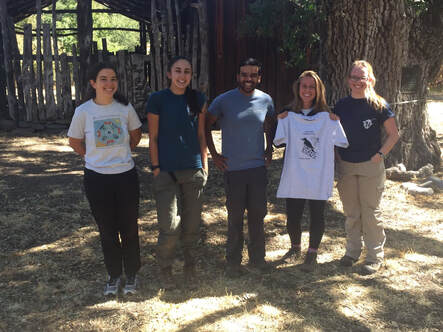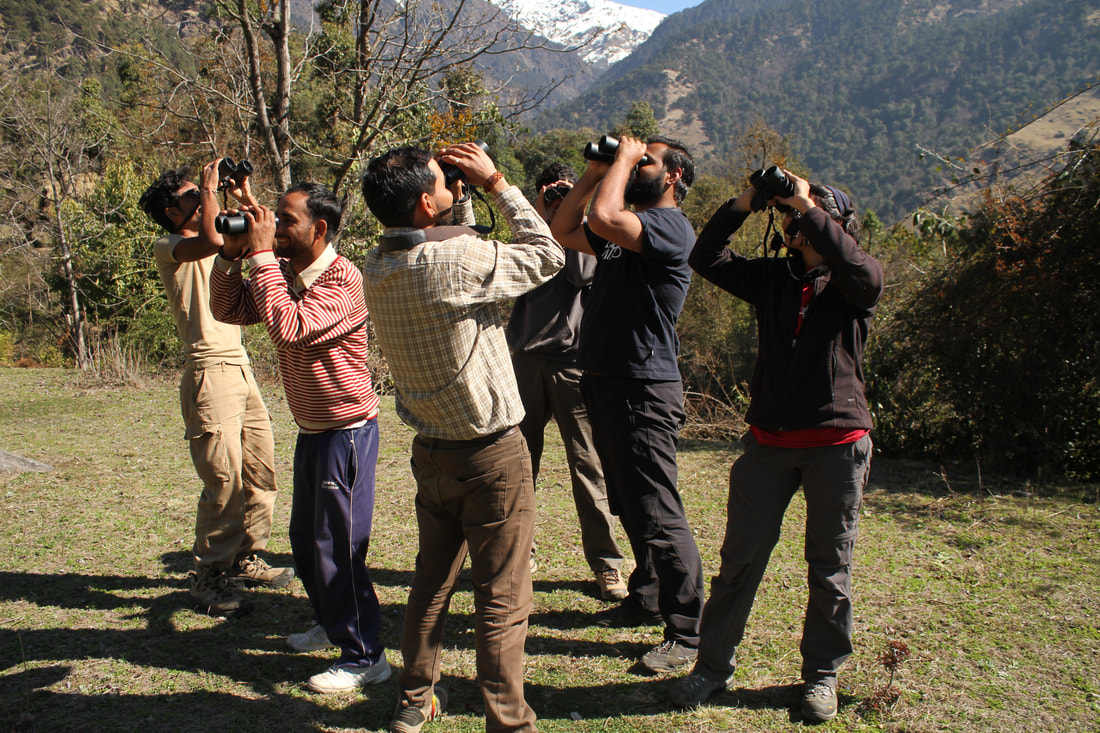PHILOSOPHY FOR SCIENCE EDUCATION
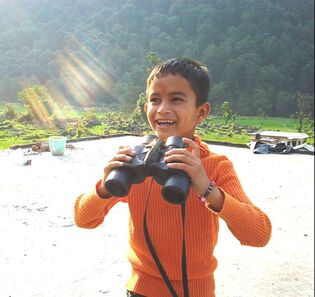
DIVERSITY, EQUITY and INCLUSION
Growing up in India, conducting research, particularly in a lesser-known field like ecology, was a sign of not being ‘smart enough’ for medicine or engineering. However, despite my middle-class background, I am privileged to have parents who appreciated my scholarship and supported my journey to academia, as both they and I faced criticism about my career choice from family, friends, and colleagues. I now use innovative and adaptable instructional techniques to ensure students have the confidence, tools and role models to overcome personal challenges and excel in their field of choice.
My experiences conducting fieldwork across the world has showed me that the sparkle in the eyes of a student holding a bird in a remote Himalayan valley is the same as that in the eyes of a student in rural California or urban Washington D.C. Wonder and appreciation of nature is universal and stems from meaningful experiences in the outdoors. I aspire to continue engaging students through increasing accessibility for diverse students to field courses and international fieldwork opportunities. I am confident that this work will enable inclusive excellence as students connect with each other, and with nature in ways that sustain their appreciation for both human diversity and biodiversity.
Through work on the Diversity, Equity and Inclusion committee of the American Ornithological Society and at the Smithsonian National Museum of Natural History, I work hard to achieve my goal of fostering an equitable environment in my community, classroom, and research field sites where everyone's scholarship and curiosity, and the thirst for knowledge, are treasured and cultivated. See CV for most updated DEI service information.
Growing up in India, conducting research, particularly in a lesser-known field like ecology, was a sign of not being ‘smart enough’ for medicine or engineering. However, despite my middle-class background, I am privileged to have parents who appreciated my scholarship and supported my journey to academia, as both they and I faced criticism about my career choice from family, friends, and colleagues. I now use innovative and adaptable instructional techniques to ensure students have the confidence, tools and role models to overcome personal challenges and excel in their field of choice.
My experiences conducting fieldwork across the world has showed me that the sparkle in the eyes of a student holding a bird in a remote Himalayan valley is the same as that in the eyes of a student in rural California or urban Washington D.C. Wonder and appreciation of nature is universal and stems from meaningful experiences in the outdoors. I aspire to continue engaging students through increasing accessibility for diverse students to field courses and international fieldwork opportunities. I am confident that this work will enable inclusive excellence as students connect with each other, and with nature in ways that sustain their appreciation for both human diversity and biodiversity.
Through work on the Diversity, Equity and Inclusion committee of the American Ornithological Society and at the Smithsonian National Museum of Natural History, I work hard to achieve my goal of fostering an equitable environment in my community, classroom, and research field sites where everyone's scholarship and curiosity, and the thirst for knowledge, are treasured and cultivated. See CV for most updated DEI service information.
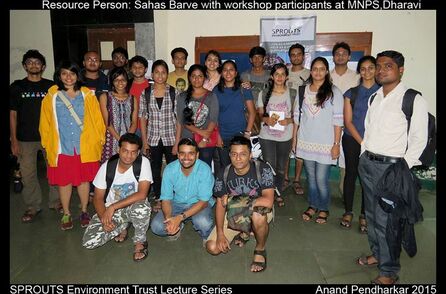
TEACHING PHILOSOPHY
Teaching ecology and evolution presents a unique and intriguing challenge. Concepts and phenomena taught in class might seem distant and abstract, yet they are unfolding directly outside the classroom. An effective teacher thus has the opportunity to transform a student’s perspective and accessibility to science irrespective of their age, college major or future profession.
TEACHING EXPERIENCE (See CV for most updated teaching experience)
Instructor, (Skype a Scientist) 2020-Present
Online interactive classrooms for grade school students on evolutionary biology
Lead Instructor (Cornell University) Fall 2015
From dingos to dodos- ecology and evolution on islands (Freshman Writing Seminar)
Teaching Assistant (Cornell University) 2012-2016
Courses: Ecology and the Environment, Introduction to Conservation Biology , Introduction to Evolutionary Biology and Diversity and Tropical Field Ornithology
Guest Faculty
SPROUTS (Mumbai), Summer, 2015
Workshop: One day-workshop on the basics of biological evolution
Wildlife Institute of India (Dehradun, India) , Spring 2013-2015
Course: Basics of biological evolution (5-day 5 lecture course)
Teaching ecology and evolution presents a unique and intriguing challenge. Concepts and phenomena taught in class might seem distant and abstract, yet they are unfolding directly outside the classroom. An effective teacher thus has the opportunity to transform a student’s perspective and accessibility to science irrespective of their age, college major or future profession.
TEACHING EXPERIENCE (See CV for most updated teaching experience)
Instructor, (Skype a Scientist) 2020-Present
Online interactive classrooms for grade school students on evolutionary biology
Lead Instructor (Cornell University) Fall 2015
From dingos to dodos- ecology and evolution on islands (Freshman Writing Seminar)
Teaching Assistant (Cornell University) 2012-2016
Courses: Ecology and the Environment, Introduction to Conservation Biology , Introduction to Evolutionary Biology and Diversity and Tropical Field Ornithology
Guest Faculty
SPROUTS (Mumbai), Summer, 2015
Workshop: One day-workshop on the basics of biological evolution
Wildlife Institute of India (Dehradun, India) , Spring 2013-2015
Course: Basics of biological evolution (5-day 5 lecture course)
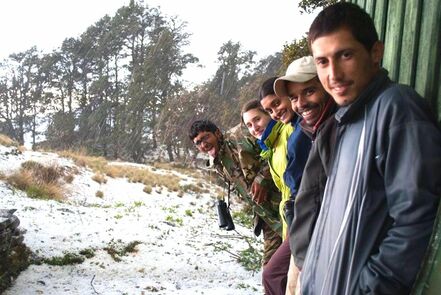
MENTORING PHILOSOPHY and EXPERIENCE
Effective mentoring requires clear communication of expectations and an adaptive, individualized approach. During research in the Himalayas and California and my Ph.D. at Cornell University, I have mentored 20 undergraduate and eight graduate students (including fifteen women) from five developed and developing countries. Most of these students were mentored in the field during active, ongoing research. As part of my mentoring program in the field, I first train students in research methods and subsequently invite them to plan sampling strategies, independently collect ancillary data and coordinate field logistics, which are all crucial skills for conducting fieldwork. Seven of my mentees have been awarded graduate fellowships and successfully enrolled in graduate ecology courses in India, France, Germany, Japan and the United States.
Publications lead by mentees
Crisologo T., Joshi V., Barve S. 2017. Jack of all calls and master of a few; vocal mimicry in the Tawny lark (Galerida deva). Avian Biology Research 10 (3) 174-180. Link
Ramesh V., Gopalkrishna T., Barve S., Melnick D. 2017. IUCN greatly underestimates threat levels of endemic birds in the Western Ghats. Biological Conservation 210 205-221. Link
Dixit S., Joshi V., Barve S. 2016. Bird diversity of the Amrutganga Valley, Kedarnath, Uttarakhand, India with an emphasis on the elevational distribution of species. Checklist. Link
Muralidhar A. and Barve S. 2013. Peculiar choice of nesting site in Red wattled lapwing (Vanellus indicus) in an urban site. Indian Birds 8(1) 6-9. Link.
Effective mentoring requires clear communication of expectations and an adaptive, individualized approach. During research in the Himalayas and California and my Ph.D. at Cornell University, I have mentored 20 undergraduate and eight graduate students (including fifteen women) from five developed and developing countries. Most of these students were mentored in the field during active, ongoing research. As part of my mentoring program in the field, I first train students in research methods and subsequently invite them to plan sampling strategies, independently collect ancillary data and coordinate field logistics, which are all crucial skills for conducting fieldwork. Seven of my mentees have been awarded graduate fellowships and successfully enrolled in graduate ecology courses in India, France, Germany, Japan and the United States.
Publications lead by mentees
Crisologo T., Joshi V., Barve S. 2017. Jack of all calls and master of a few; vocal mimicry in the Tawny lark (Galerida deva). Avian Biology Research 10 (3) 174-180. Link
Ramesh V., Gopalkrishna T., Barve S., Melnick D. 2017. IUCN greatly underestimates threat levels of endemic birds in the Western Ghats. Biological Conservation 210 205-221. Link
Dixit S., Joshi V., Barve S. 2016. Bird diversity of the Amrutganga Valley, Kedarnath, Uttarakhand, India with an emphasis on the elevational distribution of species. Checklist. Link
Muralidhar A. and Barve S. 2013. Peculiar choice of nesting site in Red wattled lapwing (Vanellus indicus) in an urban site. Indian Birds 8(1) 6-9. Link.
